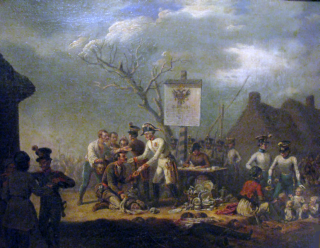“Rzeź galicyjska” by Jan Lewicki (1795-1871)
Some critical observers such as Count István Széchenyi (1791–1860) in Hungary blamed Hungary’s political weakness and economic poverty precisely on a shortsighted nobility that gave little thought to the economic welfare of the larger society and fought only to maintain its class privilege. Nobles in Galicia learned the hard way that if a Polish nation did in fact exist, its membership was limited to the uppermost classes, who were often hated by the rest of society. In another sign of the limited extent of national self-identification in these regions, peasants often mythologized their Habsburg rulers for having attempted to intervene on their behalf over the years against their noble masters. Such peasants did not see themselves as part of an imagined Hungarian or Polish nation. When in 1846 Polish nobles in Galicia rebelled against the Habsburgs, Polish- and Ukrainian-speaking peasants famously turned on their rebellious landlords in large numbers and massacred them, claiming to oppose the oppressive Polish nation in whose name the nobles had rebelled.
